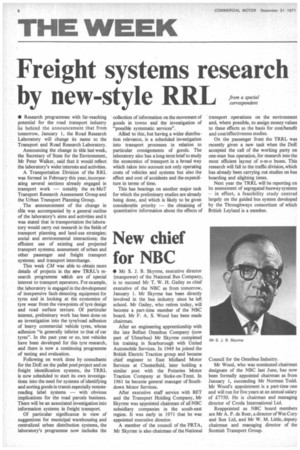Freight systems research by new-style RRL
Page 10

If you've noticed an error in this article please click here to report it so we can fix it.
from a special correspondent • Research programmes with far-reaching potential for the road transport industry lie behind the announcement that from tomorrow, January 1, the Road Research Laboratory will change its name to the Transport and Road Research Laboratory.
Announcing the change in title last week, the Secretary of State for the Environment, Mr Peter Walker, said that it would reflect the laboratory's wider interests and activities.
A Transportation Division of the RRL was formed in February this year, incorporating several sections already engaged in transport work — notably the ex-MoT Transport Research Assessment Group and the Urban Transport Planning Group.
The announcement of the change in title was accompanied by a general outline of the laboratory's aims and activities and it was stated that in transportation the laboratory would carry out research in the fields of transport planning and land-use strategies; social and environmental interactions; the efficient use of existing and projected transport systems; assessment of urban and other passenger and freight transport systems; and transport interchange.
This week CM was able to obtain more details of projects in the new TRRL's research programme which are of special interest to transport operators. For example, the laboratory is engaged in the development' of inexpensive fault-detecting equipment for tyres and in looking at the economics of tyre wear from the viewpoints of tyre design and road surface texture. Of particular interest, preliminary work has been done on an investigation into the tyre/road adhesion of heavy commercial vehicle tyres, whose adhesion "is generally inferior to that of car tyres". In the past year or so, test vehicles have been developed for this tyre research, and there is now a continuing programme of testing and evaluation.
Following on work done by consultants for the DoE on the pallet pool project and on freight identification systems, the TRRL is now scheduled to start its own investigations into the need for systems of identifying and sorting goods in transit especially remotereading label systems — with obvious implications for the road parcels business. There will be an associated investigation into information systems in freight transport.
Of particular significance in view of suggestions for municipal warehousing and centralized urban distribution systems, the laboratory's programme now includes the collection of information on the movement of goods in towns and the investigation of "possible systematic services".
Allied to this, but having a wider distribution relevance, is a scheduled investigation into transport processes in relation to particular consignments of goods. The laboratory also has a long-term brief to study the economics of transport in a broad way which takes into account not only operating costs of vehicles and systems but also the effect and cost of accidents and the expenditure in terms of time.
This has bearings on another major task for which the preliminary studies are already being done, and which is likely to be given considerable priority — the obtaining of quantitative information about the effects of transport operations on the environment and, where possible, to assign money values to these effects as the basis for cost/benefit and cost/effectiveness studies.
On the passenger front the TRRL was recently given a new task when the DoE accepted the call of the working party on one-man bus operation, for research into the most efficient layout of o-m-o buses. This research will fall to the traffic division, which has already been carrying out studies on bus boarding and alighting times.
Next year the TRRL will be reporting on its assessment of segregated busway systems -in effect, a feasibility study centred largely on the guided bus system developed by the Throughways consortium of which British Leyland is a member.












































































